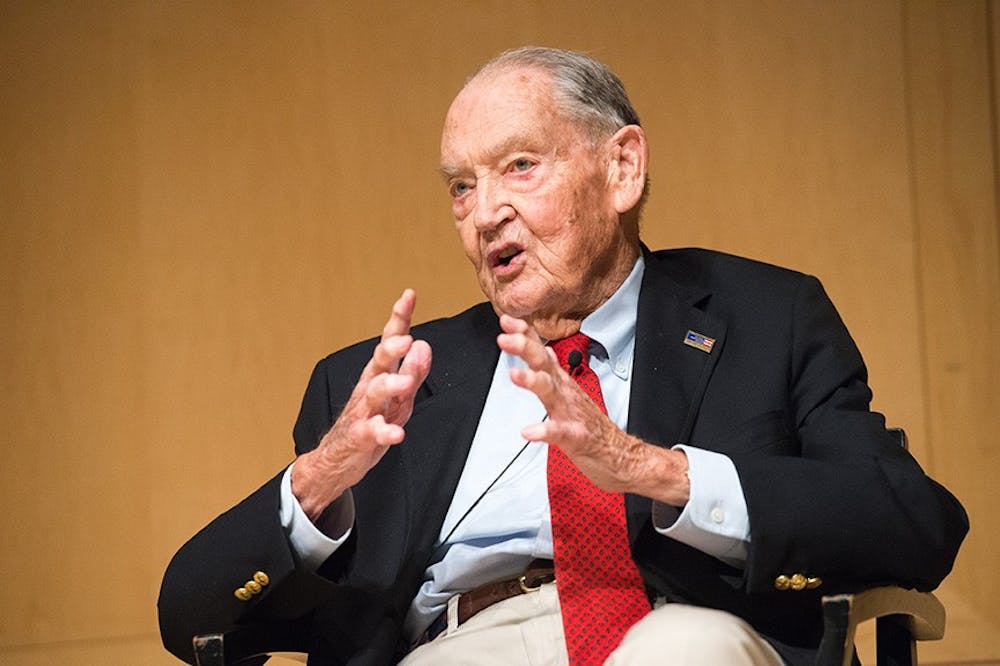University alumnus and founder of the Vanguard Group John Clifton “Jack” Bogle ’51 passed away in his home in Bryn Mawr, Pa. on Wednesday, Jan. 16 at the age of 89.
The cause of death was esophageal cancer, according to his personal assistant, Michael Nolan.
Frequently credited with “democratizing” the financial markets and transforming the financial industry, Bogle created the First Index Investment Trust, the first mutual fund that was tied to a market index, in 1975. Today, the First Index Investment Trust is known as the Vanguard 500 Index Fund.
In 1974, Bogle founded the Vanguard Group of Investment Companies, which is now the second largest asset manager in the world, managing $4.9 trillion worth of assets as of the end of 2018.
Bogle’s investment philosophy, which was drawn from his senior thesis, emphasized the average investor’s inability to profit from the stock market due to extremely high management fees. As a result, Bogle proposed an index mutual fund that would not require active management, and would therefore greatly lower the fees necessary for investment.
When speaking of the index mutual fund, the economist and Nobel laureate Paul A. Samuelson, whose ideas influenced Bogle’s invention of the index fund, ranked “this Bogle invention along with the invention of the wheel, the alphabet, Gutenberg printing, and wine and cheese.”
Bogle was born in Montclair, N.J., on May 8, 1929. He and his twin brother David Caldwell were born to William Yates Bogle, Jr. and Josephine Lorraine Hipkins Bogle.
Bogle graduated from Blair Academy and then from the University magna cum laude in 1951 with an A.B. in economics.

During his time at the University, Bogle formed a friendship with his senior thesis adviser Philip Bell ’46 *56, who was then a Ph.D. student and instructor at the University.
After graduating, Bogle joined the Philadelphia-based fund management company Wellington Fund. He eventually became president in 1967.
A few years after Wellington Fund merged with the Boston investment company Thorndike, Doran, Paine & Lewis, a managerial dispute caused Bogle to depart from the new firm and found Vanguard.
A prominent member of the University alumni community, Bogle directed much of his philanthropy work at the University. For instance, Bogle’s contributions to the University include the dormitory building Bogle Hall, located in Butler College, and the John C. Bogle ’51 Fellowships in Civic Service, which support Princeton undergraduate students pursuing service or civic engagement during the summer after their first year.

Bogle received the Woodrow Wilson Award in 1999, which recognizes an undergraduate alumnus or alumna whose achievements exemplify Woodrow Wilson's memorable phrase "Princeton in the nation's service."
“[Bogle] made it possible [so] that the average American [could] participate in the stock market at a reasonable price. Many people talked of financial inclusion, but he actually did it,“ said economics professor Markus Brunnermeier.
Brunnermeier, who is the director of the Bendheim Center for Finance, also highlighted Bogle’s role in supporting the Bendheim Center’s development.
“He was very instrumental at the beginning, when the Bendheim Center was set up. He was always somebody we could rely on and call for advice,” Brunnermeier said.
Bogle also made it a point to visit the freshman seminar, FRS 149: Ethics in Financial Markets, every fall semester for the past seven years.
“He really engaged very well with the students [and] was very dynamic despite his age. He was very interested in human interaction with the students and was always very approachable,” said Jean-Christophe de Swaan, the course’s instructor and a visiting lecturer in economics.
De Swaan noted that Bogle often stayed after class to sign copies of his book to give to students and invited them to visit him at the campus of the Vanguard Group.
Philip Sobocinski ’22, who was a student in the freshman seminar, expressed similar sentiments.
“I had gotten to the class early, and he began asking how I was liking my experience so far at Princeton,” Sobocinski said. “You wouldn’t expect one of the most important people in the history of modern finance to care about a random freshman. You could see his age physically, but his mind was as sharp as ever.”
Burton G. Malkiel *64, the Chemical Bank Chairman's Professor of Economics, Emeritus at the University and author of the bestselling book “A Random Walk Down Wall Street,” who served as a board member of the Vanguard Group for 28 years while working closely with Bogle, described him as a worker and leader.
“As a leader, the best analogy for Jack was that he was close to [becoming] an evangelical minister. Jack believed in what he was trying to do. This was, if you wish, a religion for him,” Malkiel said. “Jack basically worked all the time. Jack never retired. I don’t think I know of a harder worker than Jack in any other field.”
Bogle is survived by Eve Sherrerd, his wife of 62 years; his brother, William Yates Bogle III; his four daughters, Barbara Bogle Renninger, Jean Bogle, Nancy Bogle St. John, and Sandra Bogle Marucci; his two sons, John Jr. and Andrew; 12 grandchildren; and six great-grandchildren.
This story was updated on Sunday, Feb. 3.








